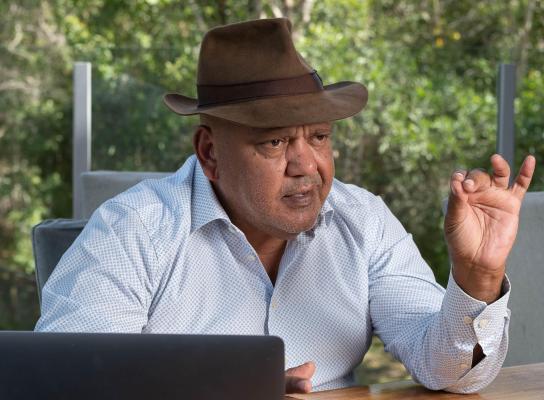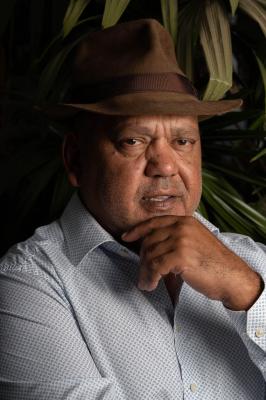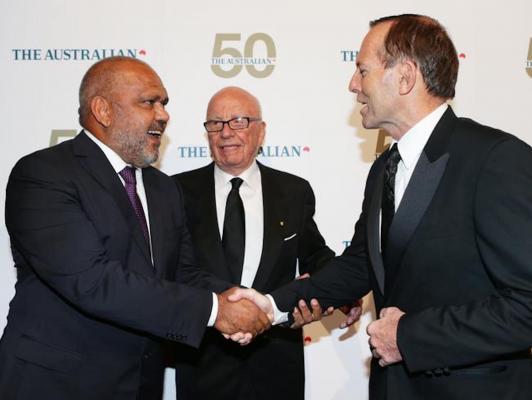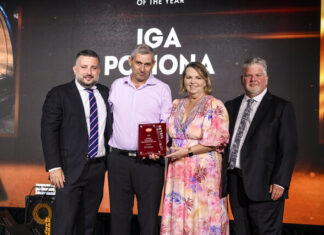Part Two of Phil Jarratt’s interview with controversial social reform advocate and lawyer Noel Pearson.
The land rights movement seemed to move into high gear just as you graduated from Sydney University.
Well, we established the Cape York Land Council while I was still studying, but I was about to graduate in law when the Mabo decision came down. My history studies had prepared me for what was to come, and so had my law studies, and I knew the story of Eddie Mabo’s case because I’d been following it since it started. By the time the High Court case came down I was in Hope Vale, but within hours I was on the plane down to Cairns with my media guy, Lew Griffiths. He was the one who connected the Cape York Land Council with the media structure, getting the images out, packaging the story, all that stuff. So he got me on the 7.30 Report that evening, talking about this watershed decision.
By this time the Land Council was two years old and we’d already been involved in a massive land rights campaign in Brisbane under Wayne Goss, which Kevin Rudd was running and I was part of his task force. Essentially, Rudd was my first boss, working in the Cabinet Office on the Aboriginal Land Act for about six months. I learnt a few things about how governments operate, how power operates.
When Rudd was running for prime minister in 2007, you famously accused him of “dudding us on land rights” 17 years earlier. Did you get the feeling back then that Rudd didn’t really get it on land rights?
I think Rudd became more expansive as prime minister, but back then he was really all about controlling land rights, keeping them to the bare minimum. The regime of land rights that he set up hasn’t delivered. That was my first taste of political expediency and Rudd played a very negative role. When Paul Keating was trying to steer the Native Title Act through in 1993, he had the most grief from the Labor government in Queensland, and Rudd was central to that.
Was land rights alone your primary focus in the ‘90s?
Yes, it was. Land rights was the foundation for everything else. We had to get that right before anything else could flow, but I’d already been focused on welfare and the social problems surrounding it. In 1988 and ’89 I had a two-year window between my history degree and my law degree, and went back home [to Hope Vale] and saw what was happening – the grog, the social problems. So it was on my agenda even then, but I got taken over by land rights in the ‘90s. By the end of the decade, having fought the Howard government over Wik [land rights claim over pastoral leases] I was ready to focus on the social issues.
Was the Light On The Hill speech a turning point for you, a public statement that this was now the Pearson agenda?
Yeah, it was. That speech sets out my thinking about the world, 20 years ago and still today. How economic class is our biggest problem. That set me off on finding answers to the question: even if we get the land back – which we are now on the cusp of securing on Cape York after 30 years – what will happen to our social and economic position?
You’ve said that your greatest regret is that 20 years ago at 35 you didn’t run for political office. Any thoughts about what might have been?
My opinion about that has only gotten stronger. What you can achieve outside of government in five years, you could achieve within government in two. You can still achieve your ambitions outside the parliament, but it’s the amount of work you have to do, the planets you have to line up, the next half-witted minister you have to convince yet again … running the same argument for the umpteenth time to some new bureaucrats. If you have executive power you only have to convince yourself. (Laughs)
Peter Garrett lasted a decade as a Labor politician – I reckon you’d last five minutes!
True. I know there are limitations, but if the challenge is to convince people, I can do that. When you’re on the outside, you can have 95 percent knowledge of the issue and the guy you’re trying to convince has five percent, but he’s got 95 percent of the power. You have to keep reminding yourself that while this person doesn’t know much, it’s their signature you need. That’s the frustration of it.
There were some crucial forks in the road, and at each of them I took the decision that we could be influential from the outside. My regret is that I should have achieved more, and not just through my effort, but the effort of all the people and organisations that I have mobilised. That’s the real cost. I have enjoined many people and many communities in the hope and possibility of this, and when those hopes and possibilities don’t work out, not because what you wanted was impossible or unachievable, but for some mundane reason, that’s where the regret comes in.
I guess the first time that you really stood on the national stage on the issue of social welfare was when you aligned yourself with John Howard over intervention in the Northern Territory.
That’s the misrepresentation of what played out. What really played out was that we had a Cape York welfare reform policy document that was inches thick. We’d been working on it for two years, funded by the federal government, and its objective was to discover what welfare reform would look like. Part of that work was done through the Families Responsibility Commission, state legislation that would set up our elders as the decision makers over welfare for the community.
Premier Anna Bligh had drafted the legislation to create the FRC and we’d lined up the funding. The last piece of this we needed was for the Commonwealth to legislate it under the Social Securities Act. Meanwhile, Mal Brough [Federal Minister for Aboriginal Affairs] was concocting this Northern Territory intervention as a response to the Little Children Are Sacred report. The NT chief minister hadn’t known how to respond to that report, so she did nothing. Mal Brough, as the gung-ho cowboy minister, comes up with the intervention. We were told about it the day before we were announcing the Cape York welfare reform. Two separate pieces of legislation were passed at the same time. I was batting for the Cape York reforms, which had been seven years in the making, and Brough comes along and hijacks our announcement with this crude NT intervention.
My advocacy was for the Cape York welfare reform. I didn’t think there should be a blanket control over welfare payments, we were giving the discretion to the elders, not Centrelink. In our model, the elders bring in the neglectful parents and have a talk to them first, giving them the chance to do the right thing. Brough’s plan put a clamp on the money up front, whether you were a good, bad or indifferent parent, and you could never be released from this regime, even if you became a good parent. It was dumb as.
It must have reminded you of the Lutherans taking your pay packets.
Yes, it took us back to the paternalism of the old mission days, which is why I never supported that. I supported the Cape York model being applied in the NT. Today on Cape York, if you haven’t sent your kid to school for three days, you’ll get a letter from the elders of the FRC asking you to come in for an interview to find out what’s going on. And they’ll give you a chance to remedy this, but if you keep breaching it, then they’ll put a clamp on your money. You don’t lose it, by the way. Your bills are paid but you don’t have cash.
The lefties were opposed to both plans. They wanted nothing to happen.
Why is that?
Because they hadn’t been in these places and had no idea of what was going on, and they didn’t believe the reports that kids were going hungry, that there were massive addiction problems, massive violence issues. And they don’t believe it when someone like me says, these are my relations, my kids, my grandkids and they’re not getting a square meal a day. Something must be done. And what we wanted to do was give them self-determination via the elders, which you’d think the Left would regard as a good thing, but they didn’t.
When you talk about the Left in this context are you talking about the Queensland Labor government?
At the time Labor generally was very indifferent. Carmen Lawrence [then ALP president] came up and visited us, and I’d known her since the land rights days when I was the poster boy for the Left, but when it came to welfare reform, it was like Dracula and garlic, and she was very allergic. Jenny Macklin was the only politician of the Left who got it after a while.
Was this philosophy of yours about personal and family responsibility the driving force behind what you called the “radical centre”?
I have my own take on what the radical centre is. In normal political discourse you have the left and the right, going at each other’s throats. That’s a big dynamic in politics, but I think there’s another dynamic that is more complicated, and it’s between the socialist, the liberal and the conservative. For me the radical centre is about finding the right balance between socialism, liberalism and conservatism. My Light On The Hill speech is an expression of belief in that.
That was 20 years ago, but just four years ago you were holding up [former Senator] Nick Xenophon as a poster boy for the radical centre. Do you still hold to that?
Yeah, I do. Look, different politicians have tried to map out what that central position is, but my idea of the radical centre is not just a politically clever manoeuvre to triangulate the situation and wrong-foot your opponents. For me the radical centre is a true position because no society would prosper if we eradicated conservatism. It plays an important role in terms of religion, heritage and our society. The best conservative definition of society comes from Edmund Burke: society is the communion between our ancestors and the living and the unborn. So when you come to consider our responsibilities in saving the planet, you start with Edmund Burke. You start with a conservative, not a radical.
In the context of saving the planet, I don’t know why that would be considered a conservative belief.
Exactly, but it came from a conservative. Why reject it for that reason? And it’s the same from the other side. We can’t reject socialism, we have to make social provision because that moral ethic is part of who we are as humans. I know that without it I would have been buggered. I was a healthy kid who was ready for opportunity, but my parents couldn’t give me opportunity, for that I had to depend on Gough Whitlam, on the state. There is an absolute truth to socialism.
I’m glad we got around to Gough because your 2014 eulogy is one of the most moving orations I’ve ever heard. Who else is in your political pantheon?
Keating, hands down. He grappled with our problems and our future. I don’t know that he got everything right or whether his thinking was complete, but he had a vision for the future of the country. I think there’s been a decline in politics since that era, in the quality of leadership particularly.
And the great black leaders?
I’m actually a very harsh critic of Obama, over health care but also because in his handling of the global financial crisis, he squibbed at the opportunity to remake the world. On the other hand, he’s a beautiful writer and his autobiography, which I’m reading at the moment, is amazing. I’ve been rereading Martin Luther King, and he remains the gold standard, not just for the rhetoric but for the policy. He was writing about class policy in 1968 when he died, and if America had adopted his agenda, we wouldn’t have Black Lives Matter today.
Where do you think we’re at with constitutional recognition, the voice?
I think we’re on track. There have been two processes – one is Ken Wyatt [Minister for Indigenous Australians] working out the legislative detail, the second is constitutionalising it. Some have said that because Ken is 100 percent on the legislation, nothing is happening on the constitution, but that’s not true. There is $170 million in the forward estimates to run the referendum. I think once Ken Wyatt has completed the bill, the Australian public will be able to see what it looks like, and see that there is nothing frightening in it. Then we go ahead and put it in the constitution, because we must guarantee the voice.
I started out this conversation by asking what you had learnt from your parents. Can I finish it by asking what you’ve learnt from your wife and children?
I’ve learnt that being an advocate and an activist is not all that life is about, or at least it shouldn’t be. Life is about enjoying and exploiting your talents and your potential, which is what I want for my children. I’ve felt this heavy duty to get things right for my kids and future generations, and perhaps my struggle will never be fully over and they will have to continue some campaigns. But I don’t want them to see that as a burden.










